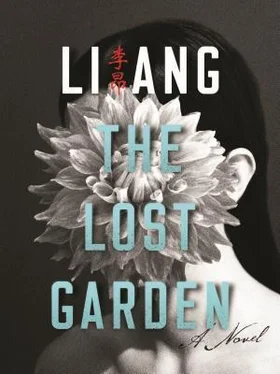It was not until high school that she had a true understanding of her father’s height, for before then she’d always had to look up at him; it was also about the same time when, through the allusion to “Flowing Pillow Pavilion,” that she began to have a vague understanding of her father’s admiration for Sun Zijing’s “Pillowing flowing water to wash one’s ears and rinsing with rocks to sharpen one’s teeth.” But at the time she was still unable to glimpse the profound meaning below the surface.
Was it because of the name, then, that her father had always been partial to the pavilion among the many pavilions, terraces, and towers in Lotus Garden? She recalled that, according to a legend passed down by generations, the pavilion got its name because there happened to be a rivulet flowing by the small pavilion terrace when the garden was completed.
Flowing Pillow Pavilion was on the west end of the garden, at the tip of a pond with irregular sides. A smaller pond of little more than a couple hundred square feet had been created by piling rocks near the pavilion; long wooden planks had been placed atop four stone pillars made of Jiaping white stone from Tangshan set in the pond, thus creating a small terrace that soared above the water. Flanking three sides of the terrace were hardwood bench seats, where one could sit and reach out to touch water lilies in the summer, when they bloomed profusely amid the graceful leaves. In mid summer, the lotus leaves might even reach across the bench seats, their lush, green figures spreading out to the middle of the pavilion.
By the time October came to an end, the lotus flowers had long since turned into seedpods and the leaves were mostly dried up. Father would sit by the fan-shaped windows in the pavilion, keeping himself mostly in shadow. Perhaps because of the darkness around him, his face remained blurred in her memory. What she remembered most vividly was actually a dying lotus branch framed by the fan-shaped window. The lone stem was bathed in the light of the yellow setting sun, looking brilliant and glorious, as if gilded. But in no time, the autumn sun set, and she could no longer make out what she had written in her notebook: “I was born in the last year of the First Sino-Japanese War. …”
I had always thought that the Sino-Japanese War was simultaneously the beginning and the end for the Taiwanese, for from that moment on, the fate of the Taiwanese was destined to be decided by others. My arrest and imprisonment, as well as the extermination of the Taiwanese elite, were simply another unavoidable continuation of the tragic fate of the Taiwanese. Except that, fortunately or unfortunately for me, I was released when they believed I was too ill to live much longer, which allowed me to drag on in my feeble existence to be an eyewitness as I awaited a Taiwanese future that could be even more tragic and deplorable.
Which is why I’m convinced that on this land there can be no true paradise, no justice, no hope. In order for you, my beloved children, to start over in a new, unsoiled place, I sent your two older brothers to study abroad when they were young. I arranged for them to live in Japan and the United States of America with the express hope that they would have a clean, fresh start, without the entanglements and hindrances of the past. Only you, Ayako, my favorite little girl, were kept by my side because of my love for you. I was really worried that if you were to leave home at too young an age, a fragile girl like you would not know how to deal with the vast outside world. I therefore sought to console myself that you, Ayako, were, after all, a girl, for whom the most significant matter in life was to find a good husband. And that was why I indulged myself with this selfish desire and kept you by my side till you graduated from high school.
But now that I have turned sixty, I cannot help but wonder every once in a while if I had any right to make these arrangements for all of you. As they have been away from a very young age, your brothers have basically forgotten about this land, their bloodline, and their familial continuity. They did indeed enjoy a new beginning, just as I had hoped. But if this new beginning turned out to be the ultimate break, then it will be I who severed the three-hundred-year continuance of the Zhu family in Taiwan. I may have given the Zhu clan two sons, two outstanding sons who hold doctoral degrees, but spiritually I have sundered the Zhu family bloodline.
Ayako, at night, when I am struck by the reality that I sinned against eight generations of the Zhu family, I am startled out of my sleep, soaked in a cold sweat, and unable to go back to sleep. Ayako, you can probably understand my feelings, since you have always been my favorite and have stayed with me the longest. You are grown up now, and have gained experience overseas. Can you tell me if the decisions I made for you and your brothers were right or wrong? Did I have the right to make such important decisions for your lives?
I imagine that your brothers, owing to work and lifestyle, will not return to make a life in Taiwan. Their children, the ninth generation of the Zhu family, will surely stay in the United States, which means that their children and grandchildren will never again be Taiwanese. Ayako, I cannot help but pin my selfish hopes on you. Though you are a girl, Zhu family blood does, after all, flow in your veins. I don’t know why, but lately I have been possessed by the laughable idea that, as if arranged by an unknown force, you will be the one to revive the Zhu family. Don’t laugh at your father for having such a notion; I am probably just getting old.
At the age of sixty with failing health, I have come to realize that what concerns me most, surprisingly, are the personal sentiments I was reluctant to talk about. Ayako, you are my favorite child. Have you given some thought to coming back to Taiwan to spend time with me before I die?
The letter had not been sent through the postal service, and had obviously been spirited out of Taiwan by someone trustworthy, in order to escape inspection. There was no envelope. All she received were a dozen or so pieces of red-bordered white cotton paper filled with his handwriting in blue ink. Tears streamed down her cheeks and dripped onto the blue words. The handwritten Japanese hiragana script was made up of few strokes, rendering the wet words recognizable only for a while. On the Chinese characters, with their complex strokes, the blue ink quickly began to spread as soon as it came into contact with her tears; the words bled into each other until they were so blurry they lost their shape, turning into round, blue, water marks dotting the white paper.
Snow still swirled outside the window, the result of the biggest snow-storm in New York in fifty years. As the night deepened, the darkening sky seemed to be under an assault by thousands of tons of snow, as if heaven and earth had broken apart and the sky was pressing down. Zhu Yinghong looked out the window, where flurries of snow were blurred by her teary vision. Her hometown would be visible only if she could see through a sky full of snow, across the American continent, and over the Pacific Ocean.
She shivered in her room, where the heater was turned all the way up.

She met him for the first time at a typical businessmen’s dinner in Taipei.
They were introduced to one another as Mr. Lin, Chairman of the Board, Lin Xigeng, and Miss Zhu, Zhu Yinghong. She had been taken there by her uncle — her mother’s only brother, who at the time was planning to sell a piece of land to Lin or looking to develop the land with him.
As “Special Assistant to the Chairman of the Board” at her uncle’s company, Yinghong was occasionally required to attend banquets with her uncle, a well-known figure in the business world, who had a long-standing strategy: with one or two women around (and not just a lady of the night who sold her body), the men who got together to talk business would behave in a more gentlemanly way, which in turn helped reduce disputes.
Читать дальше













